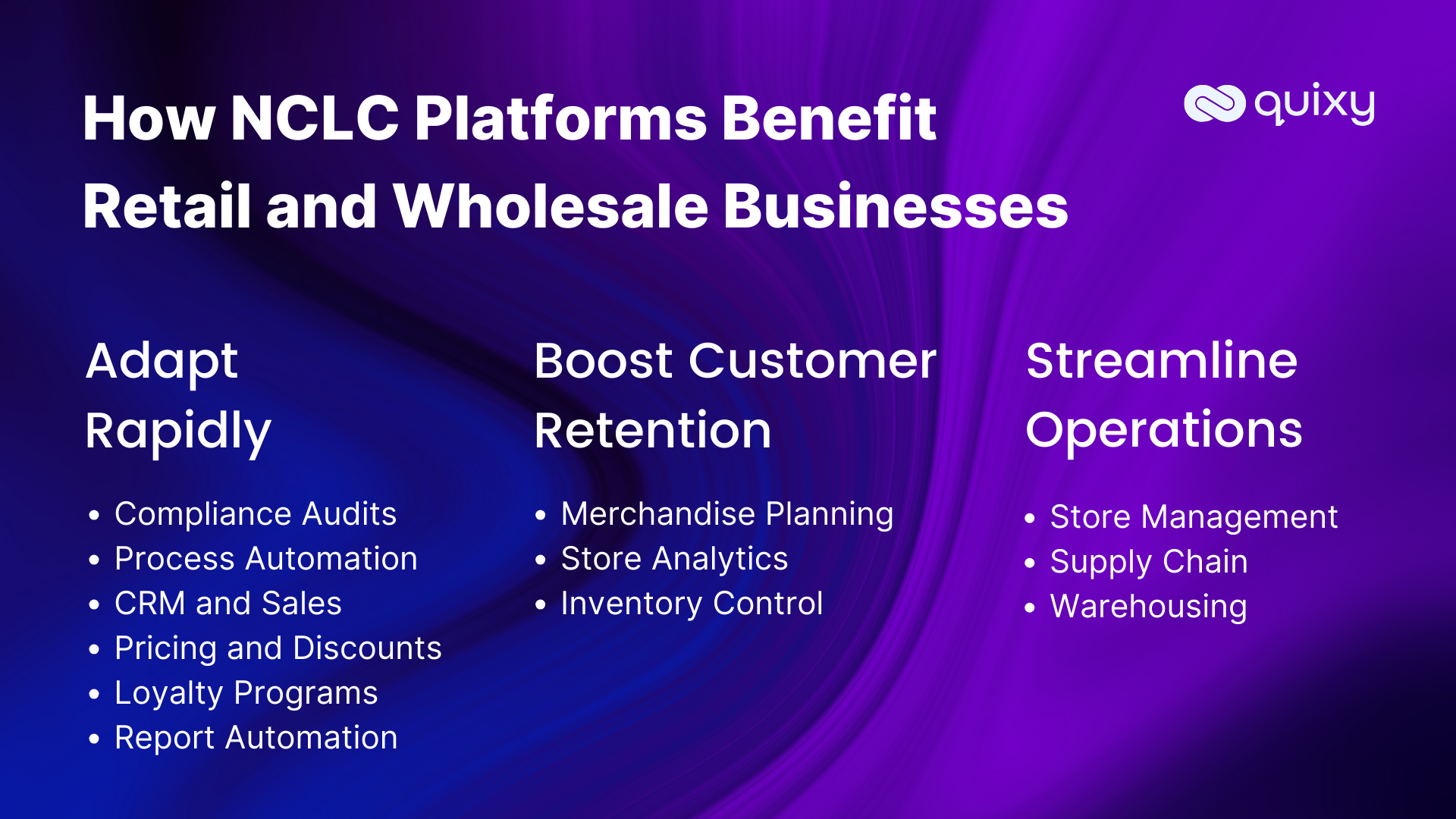
In today’s fiercely competitive retail landscape, retail digital transformation is the only requirement for business. Where customer expectations constantly evolve, businesses need to be agile and adaptable to stay ahead of the curve. Learn how No-Code Low-Code for Retail and Wholesale Processes can help optimize efficiency and productivity! This can be achieved by streamlining complex operations, increasing customer retention, and enabling rapid adaptability.
But before diving into how this is possible, let’s understand what a No-Code Low-Code is!
No-Code Low-Code Technology
No-Code, Low-Code technology allows users to create and deploy applications without writing any code or with minimal coding. The no-code low-code platforms typically provide a visual drag-and-drop interface, pre-built components, and templates that users can assemble to create their desired applications.
No-Code Low-Code platforms like Quixy are becoming increasingly popular, as they offer a number of advantages over traditional software development methods, including:
- Speed and agility: No-Code Low-Code platforms can help businesses develop and deploy applications much faster than traditional software development methods. This is because users do not need to have any coding experience and can use pre-built components and templates to get started quickly.
- Reduced costs: No-Code Low-Code platforms can also help businesses reduce the costs associated with software development. This is because businesses do not need to hire or train a team of in-house developers.
- Increased accessibility: No-Code Low-Code platforms make software development more accessible to a wider range of people, including business users and citizen developers. This allows businesses to tap into the expertise of their employees to create applications that meet their specific needs.
Also Read: What is AI in Retail Industry? 10 Key Use Cases & Best Practices
Pain Points in Retail and Wholesale: Why No-Code Is the Smart Solution
Retail and wholesale businesses face many challenges that can hinder growth, efficiency, and customer satisfaction. The pain points are numerous, from managing inventory to optimizing supply chains and enhancing the customer experience. Fortunately, a smart solution is gaining traction – no-code technology. Here are the key pain points in the retail and wholesale sectors, and explain why no-code is the ideal choice for overcoming these challenges.
1. Complex Inventory Management
The Pain: Juggling large volumes of products across multiple locations while ensuring accurate stock levels can be a logistical nightmare. Manual tracking and spreadsheet-based systems are prone to errors and can lead to overstocking or stockouts.
The Solution: No-code low-code platforms allow businesses to create custom inventory management applications tailored to their specific needs. These applications automate inventory tracking reorder processes and provide real-time insights, eliminating errors and optimizing stock levels.
Also Read: Complete Guide to Workflow Automation Software
2. Inefficient Order Processing
The Pain: Traditional order processing methods can be slow and error-prone. Delays in order fulfillment can result in dissatisfied customers and lost sales.
The Solution: No-code low-code solutions enable businesses to automate order processing workflows. From order receipt to fulfillment and shipping, these workflows can be streamlined, reducing processing times and ensuring accurate order execution.
3. Customer Experience Challenges
The Pain: Meeting the expectations of today’s tech-savvy consumers can be daunting. Providing personalized experiences, managing loyalty programs, and ensuring seamless transactions are all critical components of a positive customer experience.
The Solution: No-code low-code platforms empower businesses to quickly develop and deploy customer-centric applications. These apps can enable personalization, loyalty program management, and even mobile shopping experiences, all without the need for extensive coding skills.
Also Read: Async vs Sync: How Modern App Models Power Real-Time No-Code Innovation
4. Data-Driven Decision-Making
The Pain: In the age of data, businesses need to harness the power of analytics to stay competitive. However, making sense of vast data sets and turning them into actionable insights can be challenging.
The Solution: No-code low-code tools often come with built-in data analytics capabilities. This allows retail and wholesale businesses to easily collect, analyze, and visualize data to make informed pricing, inventory management, and customer preferences decisions.
Also Read: Retail Trends: Clear Evidence of the Industry’s Bold Transformation
5. IT Bottlenecks
The Pain: Depending on IT teams for every software development or process automation request can lead to bottlenecks and delays in implementing necessary changes.
The Solution: No-code low-code empowers non-technical users to create and modify applications and workflows. This reduces the burden on IT departments, allowing them to focus on more complex tasks while business users drive process improvements.
No-code low-code technology offers a smart solution to the pain points retail and wholesale businesses face. By enabling efficient inventory management, automating order processing, enhancing the customer experience, facilitating data-driven decision-making, and reducing IT bottlenecks, no-code platforms empower these sectors to thrive in an increasingly competitive landscape. As retail and wholesale industries continue to evolve, embracing no-code solutions lirke retail automation can be the key to sustained growth and success.
How can NCLC platforms help retail and wholesale businesses?
Here are some specific ways that these platforms can help retail and wholesale businesses thrive:

Simplify Complex Retail Operations
Store Operations
They can automate tasks such as inventory tracking, stock replenishment, order management, employee scheduling, task management, and store audits. This can help to reduce manual errors, improve productivity, and ensure adherence to operational standards.
Use Case: A retail business can use these platforms to automate the process of creating and sending purchase orders to suppliers. This ensures that inventory levels are maintained optimally, and customers never have to wait for products to be in stock.
Supply Chain Management
These platforms can automate procurement, logistics, and supplier management processes. This can help to improve supply chain visibility and collaboration, streamline communication, and reduce delays.
Use Case: A wholesale business can use NCLC platforms like Quixy to automate tracking shipments from suppliers, ensuring shipments are always on track and customers receive their orders on time.
Warehouse Management
NCLC platforms can empower floor managers with real-time data through mobile applications and automate inventory updates and order fulfillment tasks. This can help to improve business clarity and customer experience.
Use Case: For example, A warehouse manager can use the Quixy mobile app to track inventory levels in real time and identify products that need to be replenished, ensuring customers always have access to the products they need.
Increase Customer Retention
Merchandise Planning
Businesses can make informed decisions about merchandise by automating tasks such as inventory forecasting, sales & promotions, and pricing. This can help minimize risks and ensure that businesses seize opportunities to meet customer demand.
Use Case: A retail business can automate the process of forecasting demand for new products, ensuring they always have the right products in stock at the right time.
Store Performance Analytics
NCLC platforms can enable data-driven decision-making to enhance store performance by tracking KPIs related to sales, foot traffic, and conversion rates. This can help businesses identify trends and areas for improvement to optimize operations and improve customer experiences.
Use Case: A wholesale business can track sales performance by product category and region, identifying which products are selling well and which regions drive the most sales.
Inventory Management
Businesses can ensure efficient logistics and minimize delivery times by automating tasks such as stock tracking, order fulfillment, and replenishment. This can help to improve customer satisfaction and reduce the risk of stockouts.
Use Case: A retail business can use Quixy to automate fulfilling online orders, ensuring customers receive their orders quickly and accurately.
Also Read: Digital Process Automation – Everything You Need to Know
Rapid Adaptability
Store Audits and Compliance
By automating store audits and documentation, businesses can ensure compliance with operational standards, safety protocols, and regulatory requirements across store locations. This can help to maintain consistency and quality and reduce the risk of costly fines and penalties.
Use Case: A wholesale business can use NCLC platforms to automate the process of conducting store audits, ensuring all stores adhere to the company’s operational standards and safety protocols.
Also Read: No-Code in the FMCG Industry: A New Era of Innovation
Other Process Improvement Areas
In addition to the specific areas mentioned above, Quixy can also be used to automate a wide range of other retail and wholesale business processes, such as:
Vendor Management
Effective vendor management is crucial for maintaining a smooth supply chain and ensuring timely deliveries of products. NCLC platforms can automate vendor interactions and management processes, making it easier to track and collaborate with suppliers.
Use Case: A retail business can use this platform to automate the process of vendor onboarding. This includes collecting necessary documents, conducting background checks, and setting up payment terms. Automating vendor management ensures that all necessary steps are followed and helps in maintaining a database of approved vendors.
Retail Workflow and Process Automation
Retail involves numerous workflows, from order processing to returns management. These workflows can be streamlined by automating repetitive tasks and ensuring that processes are followed consistently.
Also Read: What are the Benefits of Low-Code Automation?
Use Case: In a retail store, an order fulfillment process can be automated. When an order is received, the system can automatically generate pick lists, update inventory levels, and assign tasks to employees for packing and shipping. This automation reduces the chances of errors and speeds up order processing.

Sales & CRM Solutions
Customer relationship management (CRM) is essential for building and maintaining customer loyalty. NCLC platforms can enhance CRM by automating lead tracking, customer interaction records, and sales reporting.
Use Case: A wholesale business can use automation to automate lead tracking and follow-up. When a new lead is entered into the system, Quixy can automatically schedule follow-up calls or emails at predefined intervals. This ensures that leads are not overlooked, leading to increased conversion rates.
Pricing and Discount Management
Managing pricing and discounts can be complex, especially in retail. Businesses can automate pricing strategies and discount management to ensure consistency and maximize profits.
Use Case: For instance, a retail chain can use Quixy to automate the pricing of products based on predefined rules. For example, if a product’s cost increases, the system can automatically adjust its selling price accordingly. This ensures that pricing remains competitive and profitable.
Also Read: Top 10 No-Code Startups Disrupting Industries
Loyalty Programs Automation
Customer loyalty programs are effective in retaining customers. NCLC platforms can create and manage loyalty programs efficiently, ensuring that customers are rewarded for their loyalty.
Use Case: A retail business can automate the enrolment process for its loyalty program. Customers can sign up online, and the system can automatically issue loyalty cards and track points for each purchase. This automation encourages customer participation and retention.
Automated Report Generation
Reporting is crucial for data-driven decision-making. Automated platforms can generate reports and insights automatically, saving time and ensuring that stakeholders have access to up-to-date information.
Use Case: A wholesale business can use automation to automate the generation of sales reports. As sales transactions are recorded in the system, they can also automatically compile and email daily, weekly, or monthly reports to management. This automation provides real-time insights into sales performance.
Also Read: Why Choose Quixy as your Workflow Automation Tool?
Why Automate Retail and Wholesale Processes with Low-Code No-Code
Automating retail and wholesale processes with low-code, no-code solutions offers numerous benefits:
- Efficiency: Streamlining tasks and workflows leads to faster processes and reduced manual errors.
- Cost Savings: Automation lowers operational costs by reducing labor and resource requirements.
- Agility: Easily adapt to market changes and scale operations as needed with flexible automation.
- Improved Customer Experience: Enhance service with faster order processing and more personalized experiences.
- Real-time Insights: Access data analytics for better decision-making and inventory management.
- Reduced IT Dependency: Non-technical users can create and modify processes, reducing IT workload.
- Compliance and Accuracy: Ensure data accuracy and compliance with automated checks and controls.
- Competitive Advantage: Stay ahead in the market by responding swiftly to customer demands.
- Resource Optimization: Allocate resources more effectively, optimizing stock levels and supply chain.
- Innovation: Foster innovation by empowering employees to propose and implement process improvements.
Here are some amazing facts related to NCLC platforms
- 42% of retail and wholesale trade organizations say they are using NCLC platforms to improve collaboration and access to transportation and suppliers and in production. (Source: Mendix Low-Code Verticals Study)
- 63% of retail and wholesale organizations have already developed solutions using NCLC to mitigate transport, logistics, and supply chain issues. (Source: Mendix Low-Code Verticals Study)
- 57% of retail businesses are using automation to improve customer experience. (Source: Forrester Research: “The State of Retail Automation”)
- 70% of new applications developed by organizations will use NCLC technologies by 2025. (Source: ColorWhistle)
Conclusion
With these No-Code Low-Code automation platforms, retail and wholesale businesses can thrive in a competitive landscape by simplifying operations, increasing customer retention, and adapting rapidly to changing market dynamics. It’s time to turn your vision into reality and lead your industry with sustainable growth and customer trust. Experience the transformative power of automation with Quixy today.
Frequently Asked Questions (FAQs)
Q. How does low-code no-code transform retail and wholesale processes?
Low-code, no-code solutions streamline operations, enabling rapid development and automation of tasks. They empower businesses to create custom apps and workflows without extensive coding, making processes more efficient and adaptable to changing needs.
Q. What advantages does low-code no-code bring to inventory management?
Low-code no-code simplifies inventory tracking, allowing real-time monitoring and automated alerts. This leads to reduced errors, improved inventory accuracy, and better demand forecasting, ultimately saving time and costs.
Q. Can low-code no-code elevate customer experiences in both sectors?
Yes, by enabling faster response to customer demands, personalization, and smoother transactions. Businesses can build customer-centric applications and tools with low-code no-code platforms, enhancing overall satisfaction.
Q. How is data analytics harnessed for efficiency with these solutions?
Low-code no-code platforms often integrate data analytics capabilities, allowing businesses to derive insights and make data-driven decisions more easily. This helps optimize operations and identify areas for improvement.
Q. What are the benefits of no-code low-code for retail and wholesale?
No-code and low-code offer several benefits for both retail and wholesale businesses. They enable faster application development, allowing businesses to respond quickly to changing market demands and customer needs. These solutions streamline processes, reduce errors, and improve efficiency in inventory management, order processing, and customer interactions. Additionally, they empower non-technical users to create custom solutions, reducing the reliance on IT departments. Overall, no-code and low-code technologies enhance agility, cost-effectiveness, and customer satisfaction in retail and wholesale operations.
Login
Please login to comment
0 Comments
Oldest















